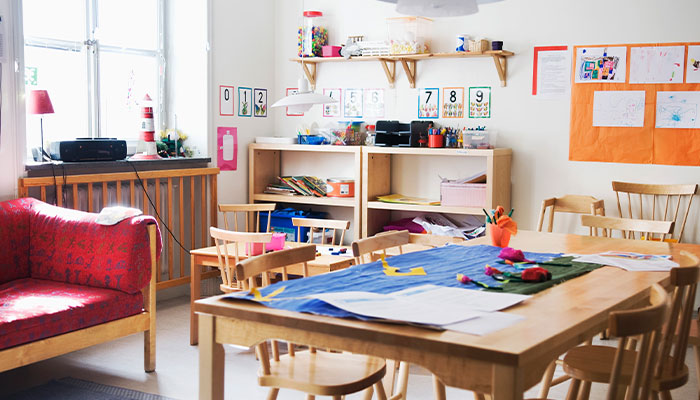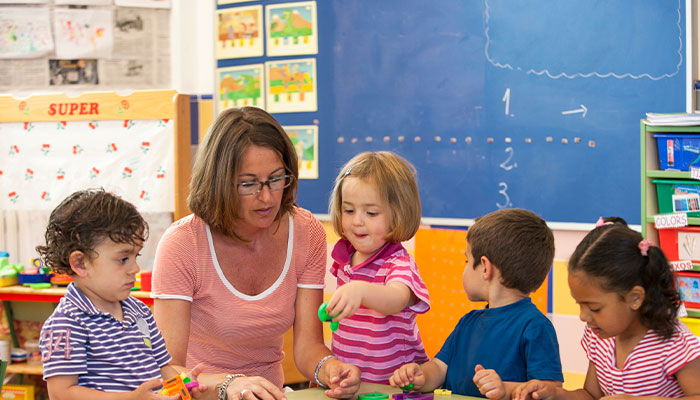Poor pay, a lack of government support, too much responsibility, and the age-old perception that early childhood education is “women's work” have contributed to the workforce crisis in the early childhood education sector.

School's out: Early childhood educators will go on strike on September 7, with demands including a pay increase.
"People see someone sitting on the floor playing with children and think that because it looks easy it is," says Dr Tamara Cumming, Senior Lecturer in Macquarie University’s School of Education. “But it is much more complex work than that.
“The reality is that this work requires a high degree of skill, knowledge and physical effort. It’s intellectually demanding and relationally complex work, and the quality of educators’ work is key to supporting children’s learning.”
On September 7, many of the 200,000 educators who each week educate and care for 900,000 Australian children, aged between birth and five, will go on strike. The United Workers Union Big Steps campaign has issued three demands: a pay increase; the placing of greater value on the early learning sector; and “putting children before profit”.
Teachers working in early childhood settings are likely to earn around $15,000 a year less than those working in school settings – even when they have the same four-year degree.
Minimum salaries are not in keeping with the skill, knowledge and responsibility required of early childhood educators’ jobs, says Cumming.
“Teachers working in early childhood settings are likely to earn around $15,000 a year less than those working in school settings – even when they have the same four-year degree.”
Early childhood educators can be paid as little as $24 an hour, even though they’re qualified, experienced and highly accountable. Early childhood education should not be seen as a poor relation of the school system, says Cumming, when it’s an integral part of Australia’s education system.
Paperwork playground
What is often not recognised, she adds, is that educators and service leaders have serious regulatory and ethical responsibilities when it comes to their work with families and children.

Complex work: Research highlights the many demands made on educators’ time through both multi-tasking and task rotation.
Many say that the documentation and administration that goes with such regulation requires educators to routinely work in their own time to keep up. The complexity of families’ lives also adds to educators’ responsibilities, compounded, as they have been, by fires, floods and COVID-19.
Educators have had to act as pseudo counsellors and family support workers, often without appropriate training or ways to deal with their own trauma.
These responsibilities come on top of the core focus of early childhood education, to provide play-based experiences that engage children and foster their learning.
A degree in multi-tasking
Cumming is the lead author of a recently-published paper, Investigating multi-tasking and task rotation as aspects of the complexity of early childhood educators’ work.
The paper reports on findings from the Australian Research Council-funded Exemplary Early Childhood Educators at Work study – documenting what it takes to be an exemplary educator. It highlights the many demands made on educators’ time through both multi-tasking and task rotation.
Australian early childhood educators, the study has found, can be doing 24 different tasks an hour, and up to 57 different tasks in a day. At busy times, they can be multi-tasking across four or five different types of work within a 20-minute period.
Through this study, says Cummings, the complexities of the job have become “visible”.
“Increasing public awareness of what it really takes to do this work will also help attract and retain educators in the sector,” she says.
The flow-on effect
Keeping educators in the sector is at the heart of the demands being made by United Workers Union members, says Cumming. According to the National Skills Commission, vacancies in the sector have more than doubled since July 2020. In July 2022, there were 6647 vacancies. Centre directors accounted for 311, early childhood teachers 2055, and early childhood educators 4281.

Best start: Early childhood education is also a child’s right, part of the United Nations Declaration on the Rights of the Child.
It’s estimated that staff turnover in the sector is currently 30 per cent, compared to 18 per cent in other industries.
The impact of that is on more than just wages, says Cumming. “Our research into educators’ well-being shows that only 10 per cent of educators who participated in our online survey believed that the public respects them as professionals. The lack of support for educators during COVID-19 – the sector was expected to stay open throughout the height of the pandemic, then was the first sector to lose JobKeeper – suggests that they are right.”
The economy, she adds, depends on early childhood services to enable families to be part of the workforce themselves.
- Coercive control: How proposed new laws will work
- Digital damage: Is your online life polluting the planet?
“This is not just an issue for families of young children. If parents can’t work because there is no-one to help with their children, businesses may not be able to operate, and economic productivity will decline.”
Early childhood education is also a child’s right, Cumming emphasises, part of the United Nations Declaration on the Rights of the Child that Australia has been signatory to since 1990. Yet the sector is at a critical juncture.
“Staff shortages are proof that pay and conditions cannot go on as they are,” she says.
“We have a National Workforce Strategy already on the table, and workforce initiatives by some state governments under way, so the stoppage on September 7 is to build public awareness of why reforms are needed. Educators feel this is the only way to move forward with the reform agenda.
Dr Tamara Cumming is a Senior Lecturer in the School of Education at Macquarie University



